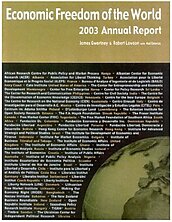The foundations of economic freedom are personal choice, voluntary exchange, and open markets. As Adam Smith, Milton Friedman, and Friedrich Hayek have stressed, freedom of exchange and market coordination provide the fuel for economic progress. Without exchange and entrepreneurial activity coordinated through markets, modern living standards would be impossible.
Potentially advantageous exchanges do not automatically occur. Their realization is dependent on the presence of sound money, rule of law, and security of property rights, among other factors. Economic Freedom of the World seeks to measure the consistency of the institutions and policies of various countries with voluntary exchange and the other dimensions of economic freedom.
Published by the Fraser Institute.
Press Contact: Cato Media Relations, 202–218-4621.
Contents:
Table of Contents and Acknowledgements [pdf, 211Kb]
Executive Summary [pdf, 96Kb]
Chapter 1 [pdf, 337Kb]
Chapter 2 [pdf, 180Kb]
Chapter 3, Country Data A through C [pdf, 297Kb]
Chapter 3, Country Data D through J [pdf, 232Kb]
Chapter 3, Country Data K through P [pdf, 236Kb]
Chapter 3, Country Data R through Z [pdf, 236Kb]
Also available on CD-Rom on this year—the data in the Economic Freedom of the World has been incorporated into a software research tool along with data from the World Bank Development Indicators. Analyze economic freedoms across groups of countries, correlate economic freedoms against growth, and produce charts for presentations.
